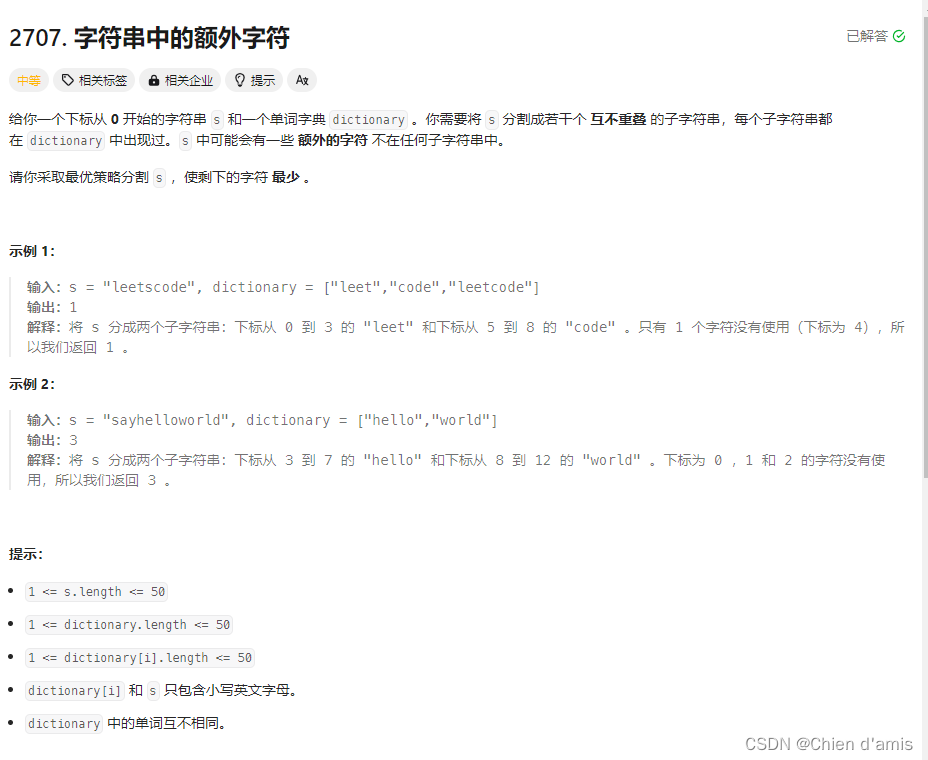2707. 字符串中的额外字符
发布时间:2024年01月09日
牛客网:https://leetcode.cn/problems/extra-characters-in-a-string/description/?envType=daily-question&envId=2024-01-09
官方解题思路为动态规划或字典数优化;
这里引入Up主的解题思路(递归)
哔哩哔哩:https://www.bilibili.com/video/BV1Ee41127LX/?spm_id_from=333.337.search-card.all.click&vd_source=f385259e95f72c4536cc27a3528bd922
Up主采用python3代码过题:
class Solution:
def minExtraChar(self, s: str, dictionary: List[str]) -> int:
@cache
def dfs(start):
if start == len(s):
return 0
result = dfs(start + 1) + 1
for end in range(start, len(s)):
word = s[start: end + 1]
if word not in dictionary:
continue
result = min(result, dfs(end + 1))
return result
return dfs(0)
细看思路很简单,递归查找并比较所留最少字符的答案;
基于此思路,开启了Go语言的模仿:
第一反应,按照Up主的思路,直接dfs递归查找,结果当场TLE,debug发现,在回溯每个dfs,都会查找一次重复数据,于是开始剪枝优化
func minExtraChar(s string, dictionary []string) int {
var dfs func(start int) int
dfs = func(start int) int {
if start == len(s) {
return 0
}
result := dfs(start+1) + 1
for end := start; end < len(s); end++ {
word := s[start : end+1]
for _, dic := range dictionary {
if word != dic {
continue
}
result = min(result, dfs(end+1))
}
}
return result
}
return dfs(0)
}
AC代码:
func minExtraChar(s string, dictionary []string) int {
cache := make(map[int]int)
var dfs func(int) int
dfs = func(start int) int {
if start == len(s) {
return 0
}
if val, ok := cache[start]; ok {
return val
}
result := dfs(start+1) + 1
for end := start; end < len(s); end++ {
word := s[start : end+1]
found := false
for _, w := range dictionary {
if word == w {
found = true
break
}
}
if !found {
continue
}
result = min(result, dfs(end+1))
}
cache[start] = result
return result
}
return dfs(0)
}
func min(a, b int) int {
if a < b {
return a
}
return b
}
文章来源:https://blog.csdn.net/u012310622/article/details/135491239
本文来自互联网用户投稿,该文观点仅代表作者本人,不代表本站立场。本站仅提供信息存储空间服务,不拥有所有权,不承担相关法律责任。 如若内容造成侵权/违法违规/事实不符,请联系我的编程经验分享网邮箱:chenni525@qq.com进行投诉反馈,一经查实,立即删除!
本文来自互联网用户投稿,该文观点仅代表作者本人,不代表本站立场。本站仅提供信息存储空间服务,不拥有所有权,不承担相关法律责任。 如若内容造成侵权/违法违规/事实不符,请联系我的编程经验分享网邮箱:chenni525@qq.com进行投诉反馈,一经查实,立即删除!
最新文章
- Python教程
- 深入理解 MySQL 中的 HAVING 关键字和聚合函数
- Qt之QChar编码(1)
- MyBatis入门基础篇
- 用Python脚本实现FFmpeg批量转换
- 应急响应常用命令
- C语言求回文数(详解版)
- 添加学生对象并遍历.需求:定义一个集合,添加一些学生对象,并进行遍历。学生类的属性为:姓名,年龄。要求从键盘录入
- SpringBoot整合MongoDB详解
- 【INTEL(ALTERA)】F-tile 参考时钟和系统 PLL 时钟英特尔? FPGA IP无法锁定在特定频率?
- 【本地缓存篇】LFU、LRU 等缓存失效算法
- Prometheus C++使用教程
- 公司新招了个字节拿36K的人,让我见识到了什么才是测试扛把子......
- 二、C#基础语法( 函数与方法)
- 基于人工智能 RL 算法的边缘服务器智能选择 模式研究
